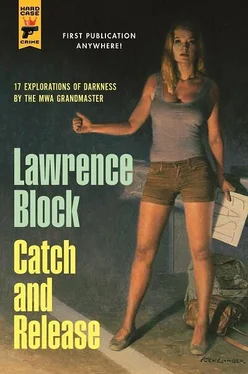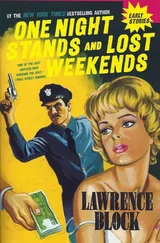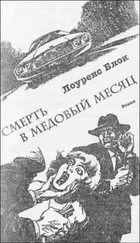These days, of course, he prepared it himself. He hadn’t needed to learn how, he’d always made breakfast for both of them on Saturdays, and now the time he spent whisking eggs in a bowl and turning rashers with a fork was a time for him to think of her and regret her passing.
So sudden it had been. He’d retired, and she’d said, in mock consternation, “Now what am I going to do with you? Am I going to have you underfoot all day every day?” And he established a routine that got him out of the house five days a week, and they both settled gratefully into that routine, and then she felt a pain and complained of shortness of breath and went to the doctor, and a month later she was dead.
He had his routine, and it was clear to him that he owed his life to it. He got up each morning, he made his breakfast, he washed the dishes by hand, he read the paper along with a second cup of coffee, and he got out of the house. Whatever day it was, he had something to do, and his salvation lay in doing it.
If it was Monday, he walked to his gym. He changed from his street clothes to a pair of running shorts and a singlet, both of them a triumph of technology, made of some miracle fiber that wicked moisture away from the skin and sent it off somewhere to evaporate. He put his heavy street shoes in his locker and laced up his running shoes. Then he went out on the floor, where he warmed up for ten minutes on the elliptical trainer before moving to the treadmill. He set the pace at 12-minute miles, set the time at 60 minutes, and got to it.
Kramer, who’d always been physically active and never made a habit of overeating, had put on no more than five pounds in the course of his thirty-five years at Taggart & Leeds. He’d added another couple of pounds since then, but at the same time had lost an inch in the waistline. He had lost some fat and gained a little muscle, which was the point, or part of it. The other part, perhaps the greater part, was having something enjoyable and purposeful to do on Mondays.
On Tuesdays he turned in the other direction when he left his apartment, and walked three-quarters of a mile to the Bat Cave, which was not where you would find Batman and Robin, as the name might lead you to expect, but was instead a recreational facility for baseball enthusiasts. Each of two dozen batting cages sported a pitching machine the standard sixty feet from home plate, where the participant dug in and took his cuts for a predetermined period of time.
They supplied bats, of course, but Kramer brought his own, a Louisville Slugger he’d picked out of an extensive display at a sporting goods store on Broadway. It was a little heavier than average, and he liked the way it was balanced. It just felt right in his hands. Also, there was something to be said for having the same bat every time. You didn’t have to adjust to a new piece of lumber.
He brought along cleated baseball shoes, too, which made it easier to establish his stance in the batter’s box. The boat-necked shirt and sweatpants he wore didn’t sport any team logo, which would have struck him as ridiculous, but they were otherwise not unlike what the pros wore, for the freedom of movement they afforded.
Kramer wore a baseball cap, too; he’d found it in the back of his closet, had no idea where it came from, and recognized the embroidered logo as that of an advertising agency that had gone out of business some fifteen years ago. It must have come into his possession as some sort of corporate party favor, and he must have tossed it in his closet instead of tossing it in the trash, and now it had turned out to be useful.
You could set the speed of the pitching machine, and Kramer set it at Slow at the beginning of each Tuesday session, turned it to Medium about halfway through, and finished with a few minutes of Fast pitching. He was, not surprisingly, better at getting his bat on the slower pitches. A fastball, even when you knew it was coming, was hard for a man his age to connect with. Still, he hit most of the medium-speed pitches — some solidly, some less so. And he always got some wood on some of the fastballs, and every once in a while he’d meet a high-speed pitch solidly, his body turning into the ball just right, and the satisfaction of seeing the horsehide sphere leap from his bat was enough to cast a warm glow over the entire morning’s work. His best efforts, he realized, were soft line drives a major league centerfielder would gather in without breaking a sweat, but so what? He wasn’t having fantasies of showing up in Sarasota during spring training, aiming for a tryout. He was a sixty-eight year old retired businessman keeping in shape and filling his hours, and when he got ahold of one, well, it felt damned good.
Walking home, carrying the bat and wearing the ball cap, with a pleasant ache in his lats and delts and triceps — well, that felt pretty good, too.
Wednesdays provided a very different sort of exercise. Physically, he probably got the most benefit from the walk there and back — a couple of miles from his door to the Murray Street premises of the Downtown Gun Club. The hour he devoted to rifle and pistol practice demanded no special wardrobe, and he wore whatever street clothes suited the season, along with a pair of ear protectors the club was happy to provide. As a member, he could also use one of the club’s guns, but hardly anyone did; like his fellows, Kramer kept his guns at the club, thus obviating him of the need to obtain a carry permit for them. The license to own a weapon and maintain it at a recognized marksmanship facility was pretty much a formality, and Kramer had acquired it with no difficulty.
He owned three guns — a deer rifle, a .22-caliber target pistol, and a hefty .357-magnum revolver. Typically, he fired each gun for half an hour, pumping lead at (and, occasionally, into) a succession of paper targets. He could vary the distance of the targets, and naturally chose the greatest distance for the rifle, the least for the magnum. But he would sometimes bring the targets in closer, for the satisfaction of grouping his shots tighter, just as he would occasionally increase the distance, in order to give himself more of a challenge.
Except for basic training, some fifty years ago, he’d never had a gun in his hand, let alone fired one. He’d always thought it was something he might enjoy, and in retirement he’d proved the suspicion true. He liked squeezing off shots with the rifle, liked the balance and precision of the target pistol, and even liked the nasty kick of the big revolver, and the sense of power that came with it. His eye was better some days than others, his hand steadier, but all in all it seemed to him that he was improving. Every Wednesday, on the long walk home, he felt he’d accomplished something. And, curiously, he felt empowered and invulnerable, as if he were actually carrying the magnum on his hip.
Thursdays saw him returning to the gym, but he didn’t warm up on the elliptical trainer, nor did he put in an hour on the treadmill. That was Monday. Thursday was for weights.
He did his circuit on the machines. Early on, he’d had a couple of sessions with a personal trainer, but only until he’d managed to establish a routine that he could perform without assistance. He kept a pocket notebook in his locker, jotting down the reps and poundages on each machine; when an exercise became too easy, he upped the weight accordingly. He was making slow but undeniable progress. He could see it in his notes, and, more graphically, he could see it in the mirror.
His gym gear made it easy to see, too. The shorts and singlet that served so well on Mondays were not right for Thursdays, when he donned instead a pair of black Spandex bicycle shorts and a matching tank top. It made him look the part, but that was the least of it. The close fit seemed to help enlist his muscles to put maximum effort into each lift. His weightlifting gloves, padded slightly in the palms for cushioning, and with the fingers ending at the first knuckle joint for a good grip, kept him from getting blisters or calluses, as well as telling the world that he was serious enough about what he was doing to get the right gear for it.
Читать дальше








